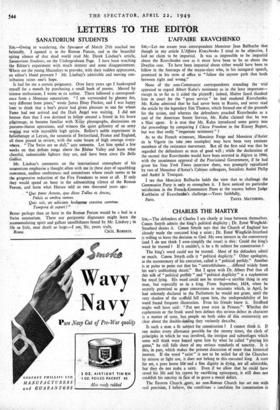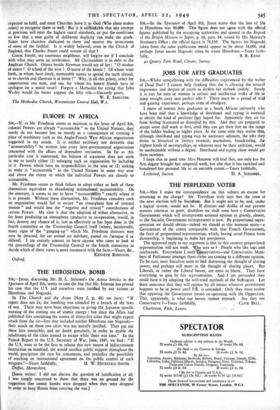CHARLES THE MARTYR
Sm,—The defenders of Charles I are clearly at issue between themselves. Canon Smyth admits the king's political duplicity ; Dr. Esme Wingfield- Stratford denies it. Canon Smyth says that the Church of England has already made the executed king a saint ; Dr. Esme Wingfield-Stratford is willing to leave the decision to God. My own interest in the controversy (and I do not think I over-simplify the issue) is this: Could the king's word be trusted ? If it couldn't, is he a fit subject for canonisation ?
The king's word could not be trusted. Most of his defenders admit so much. Canon Smyth calls it " political duplicity." Other apologists, at the tercentenary of his execution, called it " political perfidy." Another is at pains to point out that his "untruthfulness ... differed widely from his son's unblushing deceit." But I agree with Dr. Albert Peel that all this talk of " political perfidy " and " political duplicity " is a euphemism for royal lying. His word could not be trusted—a terrible thing in any man, but especially so in a king. From September, 1624, when he secretly promised to grant concessions to recusants which, in April, he had solemnly declared to the Parliament he would not grant, until the very shadow of the scaffold fell upon him, the undependability of his word found frequent illustration. Even his friends knew it. Strafford might well have said: "Put not your trust in Princes." - Whether the euphemism or the frank word best defines this serious defect in character is a matter of taste, but people on both sides of this controversy are clear about the double-dealing they variously describe.
Is such a man a fit subject for canonisation ? I cannot think it. If one makes every allowance possible for the stormy times, the clash of principles in which he was involved, the intrigue and subterfuges which some will think were forced upon him by what he called " playing his game," he still falls short of any serious standards of sanctity. It is this, in part, which makes the present discussion of more than historical interest. If the word " saint " is not to be soiled for all the Churches by misuse or light use, it does not belong to this executed king. A taste for art, a pure home lifts and a fine dignity in dying, are all admirable, but they do not make a saint. Even if we allow that he could have saved his life and his ctown by sacrificing episcopacy, it still does not establish his sanctity in face of so grave a moral defect.
The Eastern Church apart, no non-Roman Church has set out with real precision, I believe, the conditions a candidate for canonisation is
expected to fulfil, and most Churches leave it to God (Who alone makes saints) to recognise .thern as well. But it is unThinkable that any attempt at precision will omit the highest moral sandards, or put the conditions so low that a man guilty of deliberate duplicity can make the grade. Saints have churches dedicated to them and receive the invocations of some of ,the faithful. Is it widely believed,, even in the Church of Fngland, that Charles Stuart could sustain all that ?
Canon Smyth, my courteous neighbour, will forgive me if I conclude with what may seem an irrelevance. All Christendom is in debt to the Anglican Church. Others beside Newman would say of her: " 0 mother of saints I 0 school of the wise ! 0 nurse of the heroic ! Of whom went forth,-in whom have dwelt, memorable names to spread the truth abroad, or to cherish and illustrate it at home !" Why, in all this galaxy, select for canonisation. one man, and one for whom his honest friends have to apologise on a moral issue? Forgive a Methodist for saying that John Wesley would far -better support the lofty role.—Sincerely yours,



































 Previous page
Previous page